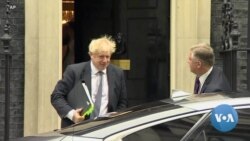LONDON — European Union leaders are deciding on another extension to Britain's exit from the bloc, after lawmakers in Britain frustrated Prime Minister Boris Johnson's plan to leave by Oct. 31. The EU's decision is likely to come toward the end of this week.
After previously pledging to leave by that deadline “do or die”, Johnson now seems determined to seek an election as soon as possible. Speaking to lawmakers Wednesday, he insisted that his government still hopes to leave the bloc on the Halloween deadline.
"I don't think the people of this country want a delay. I don't want a delay. I intend to press on. But I'm afraid we now have to see what our EU friends will decide on our behalf," Johnson said.
The prime minister was forced by law to ask the EU for an extension, even though he didn't want one, after failing to pass his Brexit deal in Parliament last Saturday.
The British leader then tried to rush the legislation through Parliament with just days to go before the deadline. While agreeing to the deal in principle, members of Parliament Tuesday voted against this timetable.
"Essentially, Boris Johnson was asking MPs to decide in three days what will impact at least a generation," said Joelle Grogan, a British constitutional analyst at Middlesex University.
So, Britain's prime minister once again awaits the EU's decision, just as Johnson's predecessor, Theresa May, did in March, which led to the October extension.
EU Council President Donald Tusk recommended that member states this time approve the three-month extension until the end of January 2020 as requested by Johnson. This would be a so-called "flextension," which could be shortened if the Brexit deal is approved in London.
If that is the EU's offer, Johnson has indicated he would push for an early election.
"But (he) doesn't necessarily have power to do it," Grogan said. "We might see a resignation, or we might see another motion for another election, essentially calling on the House of Commons to bring an early general election. The most important qualification for all of this, though, is as of right now, the U.K. is withdrawing on a no-deal basis on Oct. 31, 2019."
The EU doesn't want to be blamed for a no-deal Brexit, so it will likely eventually agree to an extension, said Agata Gostyńska-Jakubowska of the Center for European Reform policy group.
"I think the EU should focus on having as constructive a partnership with the U.K. as possible. Now those discussions will not always be easy, but it seems to me that within the EU's mindset, the U.K. has actually already left," she said.
The Withdrawal Agreement was meant to be the easy bit. Negotiating the future relationship — likely to be a free trade agreement — will be much tougher, said Gostyńska-Jakubowska.
"We will face ratifications also in national parliaments. And this is something that we can't really predict how that would be used in the domestic politics, because obviously there are different dynamics in all 27 member states."
Opposition MPs warn even if the deal is passed, Britain could face another cliff-edge at the end of next year when the transition period expires if there is no free trade agreement in place.
In Britain and Brussels there is growing Brexit fatigue, but this is just the beginning of a process that will likely take several years.











